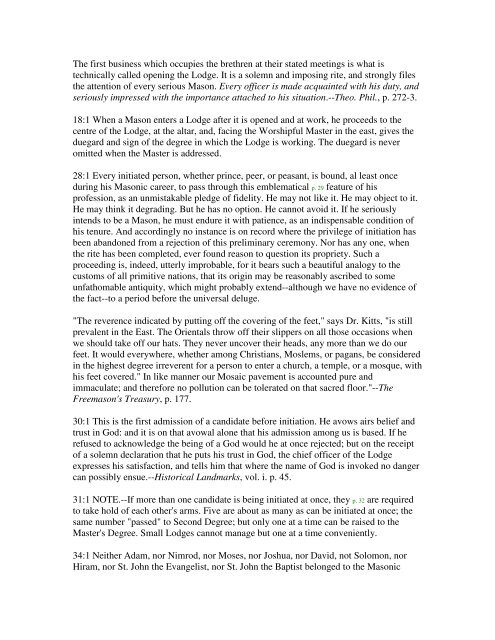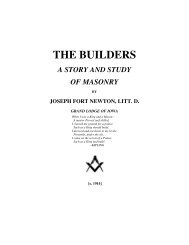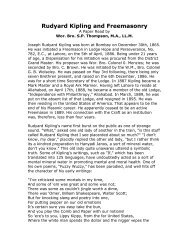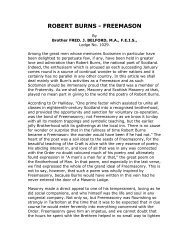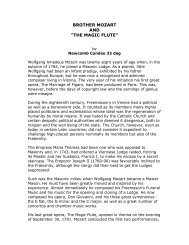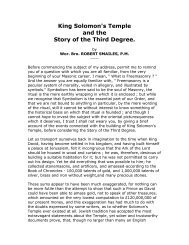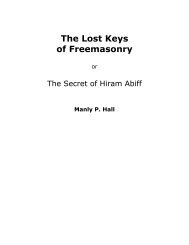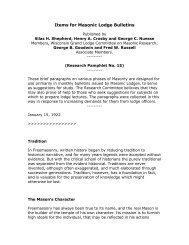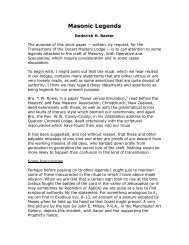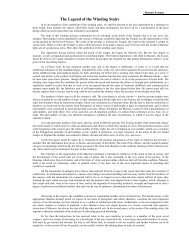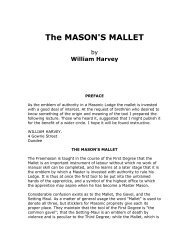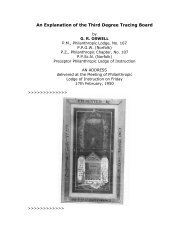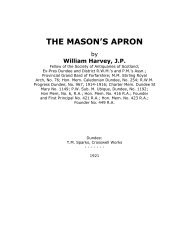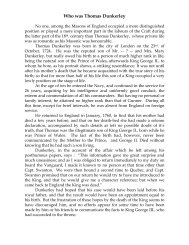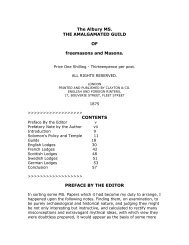Duncan's Masonic Ritual and Monitor - Rose Croix
Duncan's Masonic Ritual and Monitor - Rose Croix
Duncan's Masonic Ritual and Monitor - Rose Croix
You also want an ePaper? Increase the reach of your titles
YUMPU automatically turns print PDFs into web optimized ePapers that Google loves.
The first business which occupies the brethren at their stated meetings is what is<br />
technically called opening the Lodge. It is a solemn <strong>and</strong> imposing rite, <strong>and</strong> strongly files<br />
the attention of every serious Mason. Every officer is made acquainted with his duty, <strong>and</strong><br />
seriously impressed with the importance attached to his situation.--Theo. Phil., p. 272-3.<br />
18:1 When a Mason enters a Lodge after it is opened <strong>and</strong> at work, he proceeds to the<br />
centre of the Lodge, at the altar, <strong>and</strong>, facing the Worshipful Master in the east, gives the<br />
duegard <strong>and</strong> sign of the degree in which the Lodge is working. The duegard is never<br />
omitted when the Master is addressed.<br />
28:1 Every initiated person, whether prince, peer, or peasant, is bound, al least once<br />
during his <strong>Masonic</strong> career, to pass through this emblematical p. 29 feature of his<br />
profession, as an unmistakable pledge of fidelity. He may not like it. He may object to it.<br />
He may think it degrading. But he has no option. He cannot avoid it. If he seriously<br />
intends to be a Mason, he must endure it with patience, as an indispensable condition of<br />
his tenure. And accordingly no instance is on record where the privilege of initiation has<br />
been ab<strong>and</strong>oned from a rejection of this preliminary ceremony. Nor has any one, when<br />
the rite has been completed, ever found reason to question its propriety. Such a<br />
proceeding is, indeed, utterly improbable, for it bears such a beautiful analogy to the<br />
customs of all primitive nations, that its origin may be reasonably ascribed to some<br />
unfathomable antiquity, which might probably extend--although we have no evidence of<br />
the fact--to a period before the universal deluge.<br />
"The reverence indicated by putting off the covering of the feet," says Dr. Kitts, "is still<br />
prevalent in the East. The Orientals throw off their slippers on all those occasions when<br />
we should take off our hats. They never uncover their heads, any more than we do our<br />
feet. It would everywhere, whether among Christians, Moslems, or pagans, be considered<br />
in the highest degree irreverent for a person to enter a church, a temple, or a mosque, with<br />
his feet covered." In like manner our Mosaic pavement is accounted pure <strong>and</strong><br />
immaculate; <strong>and</strong> therefore no pollution can be tolerated on that sacred floor."--The<br />
Freemason's Treasury, p. 177.<br />
30:1 This is the first admission of a c<strong>and</strong>idate before initiation. He avows airs belief <strong>and</strong><br />
trust in God: <strong>and</strong> it is on that avowal alone that his admission among us is based. If he<br />
refused to acknowledge the being of a God would he at once rejected; but on the receipt<br />
of a solemn declaration that he puts his trust in God, the chief officer of the Lodge<br />
expresses his satisfaction, <strong>and</strong> tells him that where the name of God is invoked no danger<br />
can possibly ensue.--Historical L<strong>and</strong>marks, vol. i. p. 45.<br />
31:1 NOTE.--If more than one c<strong>and</strong>idate is being initiated at once, they p. 32 are required<br />
to take hold of each other's arms. Five are about as many as can be initiated at once; the<br />
same number "passed" to Second Degree; but only one at a time can be raised to the<br />
Master's Degree. Small Lodges cannot manage but one at a time conveniently.<br />
34:1 Neither Adam, nor Nimrod, nor Moses, nor Joshua, nor David, not Solomon, nor<br />
Hiram, nor St. John the Evangelist, nor St. John the Baptist belonged to the <strong>Masonic</strong>


